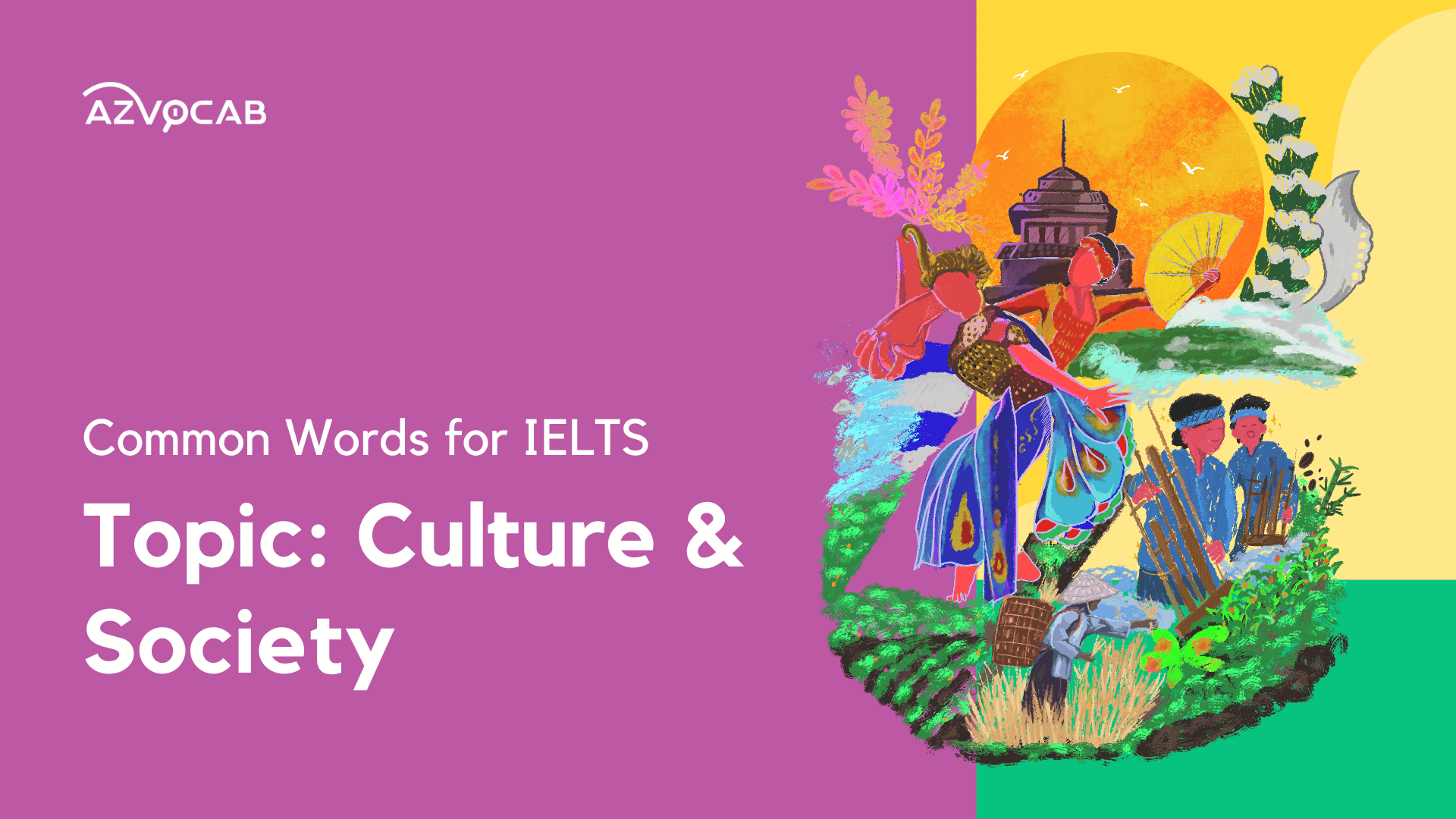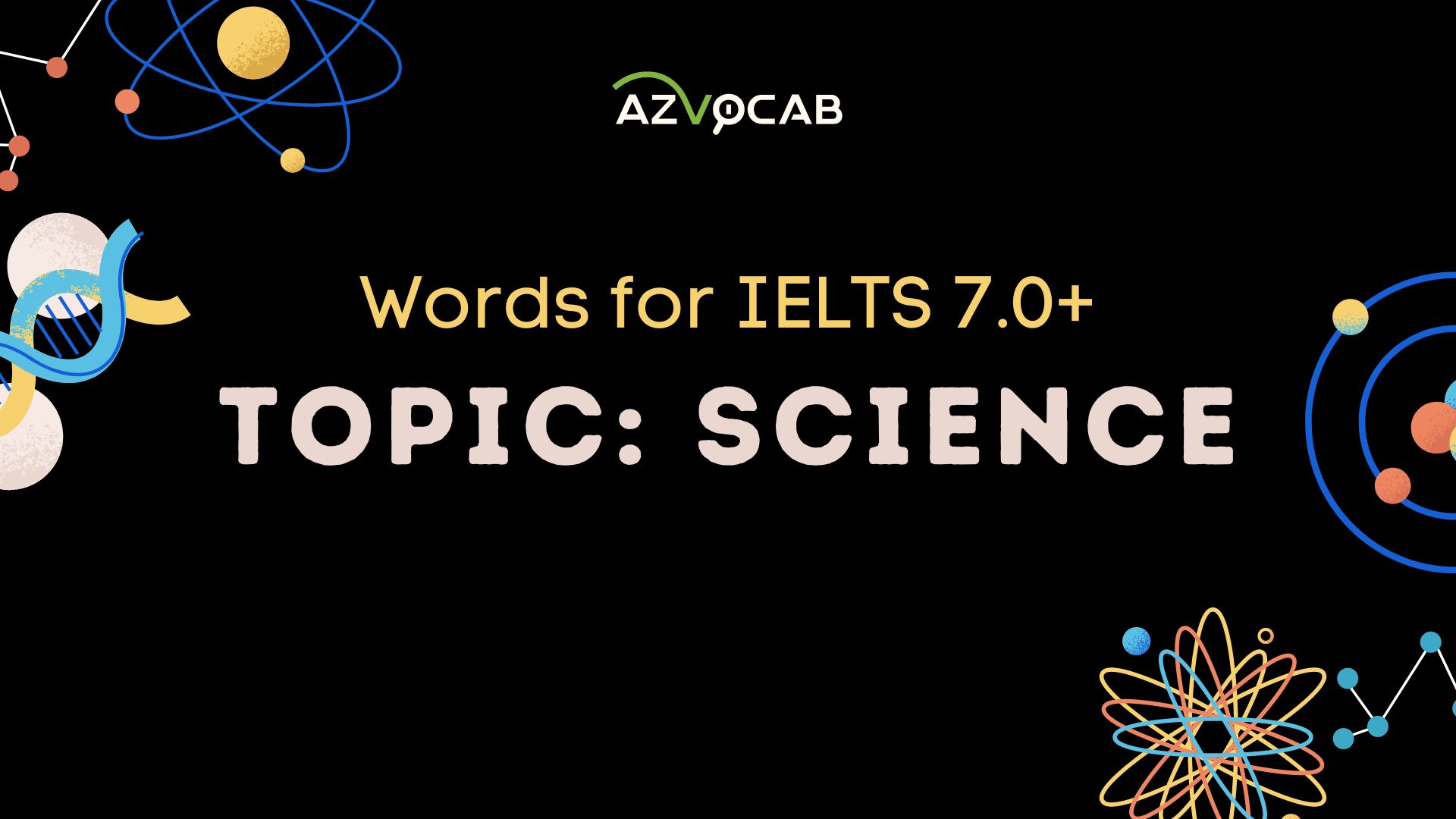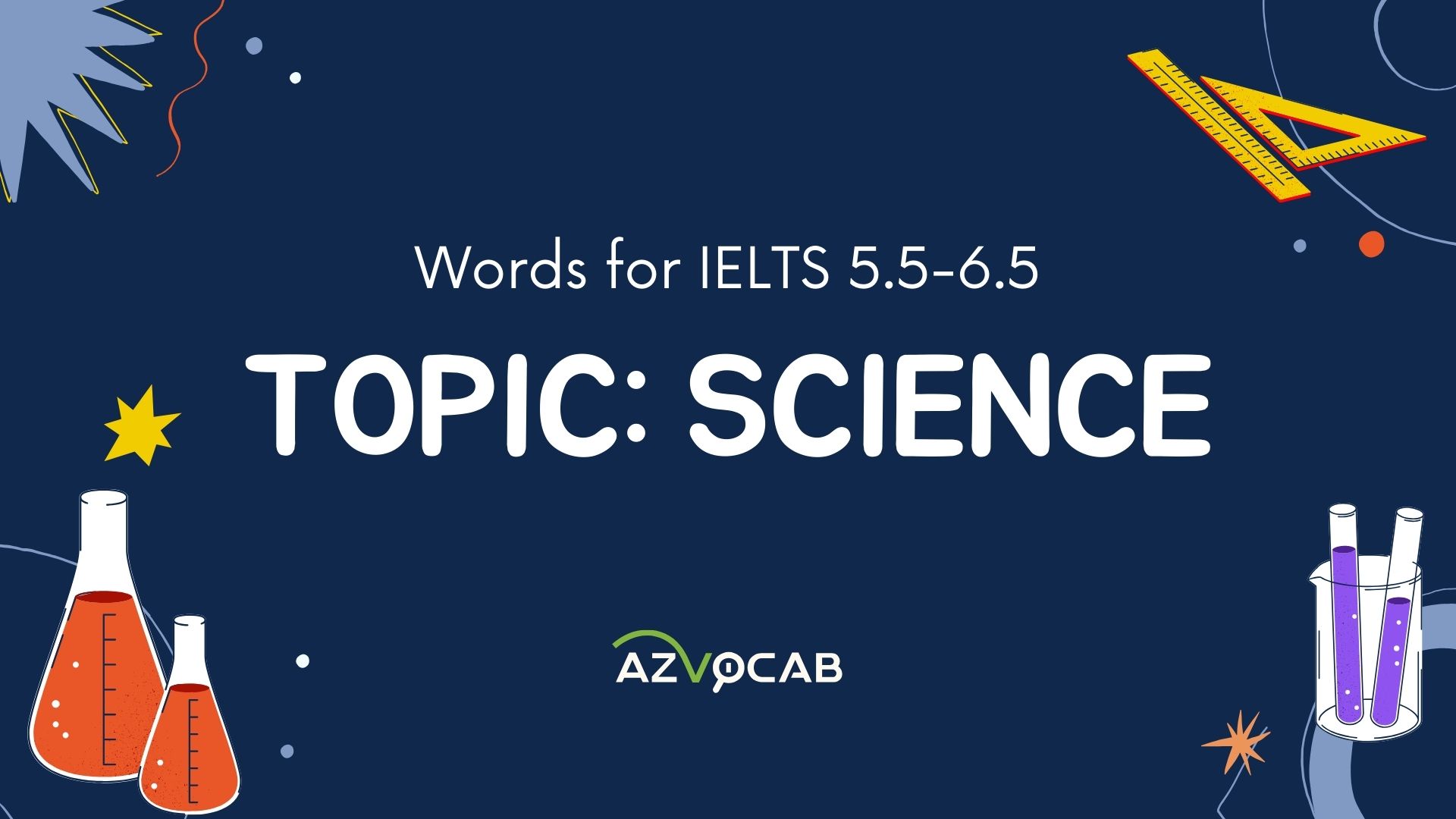80+ Common Words for the Culture and Society Topic in the IELTS exam
30 August, 2023Common words for IELTS

azVocab has compiled over 80 common words on the topic of “Culture and Society” for the IELTS exam. These vocabulary words can be used in all four sections of four skills: Reading, Listening, Speaking, and Writing. azVocab has carefully selected examples that fit specific contexts in IELTS exams. This will help you understand how to use these words in context, increasing the effectiveness of your vocabulary learning.
1. Vocabulary related to cultural characteristics
| culture (n.) – the way of life, especially the general customs and beliefs, of a particular group of people at a particular time | People can enjoy products from many different cultures today. |
| cycle (n.) – a group of events that happen in a particular order, one following the other, and are often repeated | Historians see history as being driven by a combination of cumulative long-term trends and short to mid-term cycles, each of which contains the seeds of a subsequent but familiar situation. |
| diversity (n.) – the fact of many different types of things or people being included in something; a range of different things or people | There is a lot of give and take going on and you still get cultural diversity to some extent. |
| globalisation (n.) – the increase of trade around the world, especially by large companies producing and trading goods in many different countries | Globalisation has made it possible to produce clothing at increasingly lower prices, prices so low that many consumers consider this clothing to be disposable. |
| heritage (n.) – features belonging to the culture of a particular society, such as traditions, languages, or buildings, that were created in the past and still have historical importance | Above all, they are records of cultural heritage and ways of expressing a community’s relationships with nature, between themselves and the wider world. |
| icon (n.) – a very famous person or thing considered as representing a set of beliefs or a way of life | When people go travelling to far-flung places, they want to see something exotic, not the same icons they see all around them at home! |
| identity (n.) – the fact of being, or feeling that you are, a particular type of person, organization, etc.; the qualities that make a person, organization, etc. different from others | After taking the throne in 1974, King Jigme Singye Wangchuck instituted a number of policies designed to preserve the country’s cultural identity. |
| implication (n.) – an occasion when you seem to suggest something without saying it directly | While advertising generated modern anxieties about its social and ethical implications, it nevertheless acquired a new centrality in the 1920s. |
| influence (n.) – the power to have an effect on people or things, or a person or thing that is able to do this | The results strongly support the idea that human influence has a huge effect on making some songs more popular than others. |
| modernisation (n.) – the act of making something more modern | The modernization of the 100-year-old sewage and water systems will cost millions of pounds. |
| multiculturalism (n.) – the belief that different cultures within a society should all be given importance | Switzerland is well known for cheese fondue, penguin parades and its multiculturalism. |
| norm (n.) – an accepted standard or a way of behaving or doing things that most people agree with | Gradually, over time, as our society becomes more and more multicultural, there is a blending of these customs and we gradually come to redefine the norm. |
| notion (n.) – a belief or idea | It is based on the notion of equal opportunities for all, equitable distribution of wealth and public responsibility for those unable to meet their own needs. |
| conservative (adj.) – not usually liking or trusting change, especially sudden change | There are those who observe these social mores religiously, and these people are often labelled ‘conservative‘. |
| cultural (adj.) – relating to the habits, traditions, and beliefs of a society | What is known, however, is that the later Mayan peoples, who did leave behind a great deal of cultural evidence, based much of their high culture on earlier Olmec traditions. |
| ethnic (adj.) – relating or belonging to a group of people who can be seen as distinct (= different) because they have a shared culture, tradition, language, history, etc. | The difference in numbers between men and women who advance and persist in their fields cannot be attributed to race, ethnic, or social group. |
| multicultural (adj.) – including people who have many different customs and beliefs, or relating to a society, organization, city, etc. like this | I think globalisation could mean that we end up living a more interesting and multicultural life. |
| compound (v.) – to mix two things together | This problem is compounded by the fact that not only is the number of inhabitants diminishing, but they are also growing older. |
| conform (v.) – to behave according to the usual standards of behaviour that are expected by a group or society | When people conform, it helps make society more peaceful. |
| attitude (n.) – a feeling or opinion about something or someone, or a way of behaving that is caused by this | As a species, we humans appear to have a much more active attitude towards our environment than any other species. |
| community (n.) – the people living in one particular area or people who are considered as a unit because of their common interests, social group, or nationality | A great idea to get children out of the house is to find out about how they can help in your local community. |
| standard (n.) – a level of quality | And we expect people to behave according to our accepted standards of behaviours. |
| influential (adj.) – having a lot of influence on someone or something | First adopted and flaunted by influential stars like the Rolling Stones in the early 1970s, tattooing had, by the late 1980s, become accepted by ever-broader segments of mainstream society. |
| unconventional (adj.) – different from what is usual or from the way most people do things | There will always be those who seek to break away from tradition and rebel. These people see themselves as unconventional in every sense of the world. |
| miscalculate (v.) – to judge a situation badly | He miscalculated badly when he underestimated the response of the international community to the invasion. |
| misinterpret (v.) – to form an understanding that is not correct of something that is said or done | When we re-examined the regulations, we realized that we had misinterpreted them. |
| misjudge (v.) – to form an opinion or idea about someone or something that is unfair or wrong | It’s easy to misjudge people when you don’t really know them. |
2. Vocabulary related to social positions
| bureaucrat (n.) – someone working in a bureaucracy | It turned out she was one of those faceless bureaucrats who control our lives. |
| civil servant (n.) – a person who works for local, state, or esp. the federal government | A senior civil servant has been disciplined for revealing secret government plans to the media. |
| mayor (n.) – a person who is elected or chosen to lead the group who governs a town or city | This museum first opened its doors in 1985, the result of years of effort by the mayor and others in our city. |
| middle class (n.) – a social group that consists of well-educated people, such as doctors, lawyers, and teachers, who have good jobs and are not poor, but are not very rich | The upper middle class tends to go into business or the professions, becoming, for example, lawyers, doctors, or accountants. |
| state (n.) – a country or its government | A welfare state is a taxation system which allows the state to provide for the economic and social well-being of its citizens. |
| status (n.) – an accepted or official position, especially in a social group | Those students who are described as being both popular and well-liked manage to balance their high social status with positive qualities such as being kind and friendly. |
| working class (n.) – a social group that consists of people who earn little money, often being paid only for the hours or days that they work, and who usually do physical work | The working class usually reacts in a predictable way to government policies. |
| affluent (adj.) – having a lot of money or owning a lot of things | Affluent countries like Australia and Canada have a responsibility to help poorer countries. |
| wealthy (adj.) – rich | In the 1980s and 90s, as technology made globalisation even easier, the downward trend for the wealthy countries continued falling to a low of two percent at the end of this period. |
3. Vocabulary related to social services and organizations
| brand (n.) – a type of product made by a particular company and sold under a particular name | Luxury brands dominate both the cosmetic and skincare market. |
| military service (n.) – army training that young people must do in some countries | The existence of pensions can be traced back as far as the Roman Empire, when soldiers were provided with a pension on retiring from military service. |
| old-age pension (n.) – a pension that is paid by the state to people who have stopped working because they have reached a particular age | The old-age pension drawn monthly shall be determined by the premium payment years of the employees. |
| social service (n.) – a service provided by local or national government or another organization to help people who are old or ill or need support in their lives | After the Second World War, some social services were taken care of by charitable organizations. |
| charitable (adj.) – giving money, food, or help free to those who are in need because they are ill, poor, or have no home | The entire organization is funded by charitable donations. |
| essential (adj.) – necessary or needed | Healthcare and education are both essential services that can be extremely expensive and as a result, unaffordable for those on a limited budget. |
| contribute (v.) – to give something, especially money, in order to provide or achieve something together with other people | I learned about all kinds of people – politicians, inventors, soldiers, and even common everyday people who contributed to our history. |
| council (n.) – the group of people elected to govern a particular area, town, or city, and organize services for it | The local council of Esperance issued the USA with a $400 fine for littering. |
| joint venture (n.) – a business or business activity that two or more people or companies work on together | According to this author, there’s a new energy drink taking over the market and it’s a joint venture between Thailand and Austria. |
| safety net (n.) – a system to help those who have serious problems and no other form of help | Alternatively, a welfare state cab refers to the creation of a safety net to provide social services such as free childcare. |
| segment (n.) – one of the smaller groups or amounts that a larger group or amount can be divided into | A company creates a diverse product and pricing portfolio to meet the price range and needs of different customer segments. |
| stockpile (n.) – a large amount of food, goods, or weapons that are kept ready for future use | They have a stockpile of weapons and ammunition that will last several months. |
| elderly (adj.) – old | The social cohesion of a small community can also be blighted by the seasonal migration of people to the cities to look for work out of season, leaving only the elderly behind. |
| merge (v.) – to combine or join together, or to cause things to do this | If not for globalization, companies from different countries would not merge to do business. |
| factor in (phr.v) – to include something when you are doing a calculation, or when you are trying to understand something | To make accurate predictions we need to factor in the effect people have on their environment. |
4. Vocabulary related to social development
| demographics (n.) – the number and characteristics of people who live in a particular area or form a particular group, especially in relation to their age, how much money they have and what they spend it on | Then the company will discuss a wide range of factors about the product itself: what are the demographics (age, sex, education, income levels, etc.) and location of the people who are likely to use the product? |
| development (n.) – the process in which someone or something grows or changes and becomes more advanced | Urban development due to an increased population also takes its toll as trees are cleared to make way for houses. |
| minority (n.) – a smaller number or part | Under capitalism, a small minority of people are in control of the money and resources of the planet. |
| prediction (n.) – a statement about what you think will happen in the future | Predictions of the effects of global warming on the Gulf Stream are based on computer models, which differ to some extent. |
| projection (n.) – a calculation or guess about the future based on information that you have | On current projections, there will be more than 426 million people over 80 in 2050. |
| proportion (n.) – the number or amount of a group or part of something when compared to the whole | Not only will the populations of each of these societies dwindle, but an increasing proportion will be moving into old age, when they are less productive and use more health resources. |
| statistics (n.) – a collection of numerical facts or measurements, as about people, business conditions, or weather | One of the few areas in which long-term trends can be clearly seen is demographic statistics. |
| autonomous (adj.) – an autonomous organization, country, or region is independent and has the freedom to govern itself | They proudly declared themselves part of a new autonomous province. |
| demographic (adj.) – relating to demography (= the study of populations and the different groups that make them up) | The single fastest-growing demographic group seeking tattoo services is, to the surprise of many, middle-class suburban women. |
| global (adj.) – relating to the whole world | To prevent a catastrophe of global proportions, we need to find a way to reach a compromise between meeting our energy needs and living in an environmentally sustainable way. |
| harmonious (adj.) – friendly and peaceful | One of the main factors in ensuring a harmonious society is that there are clear, established patterns in the way we conduct ourselves. |
| mid-term (adj.) – in the middle of the period when a government is in office | Political balance can not be achieved by criticizing one party during the mid-term of a parliament and another at election time. |
| productive (adj.) – resulting in or providing a large amount or supply of something | On her most productive day, a worker should be able to walk four to five miles and burn as many as fifteen hundred calories while maintaining a normal workload. |
| subsequent (adj.) – happening after something else | Those concerns were overshadowed by subsequent events. |
| worldwide (adj.) – existing or happening in all parts of the world | Cloudy Germany is the worldwide leader in the use of solar power. |
| flourish (v.) – to grow or develop successfully | For most of human history, societies have been based on people cooperating to survive and flourish. |
5. Vocabulary related to social issues
| dilemma (n.) – a situation in which a difficult choice has to be made between two different things you could do | Many Muslim women face the terrible dilemma of having to choose between employment and their Islamic garb. |
| ageing (n.) – the process of growing old | Such population structures are also seen elsewhere, suggesting that population ageing may be widespread. |
| hindsight (n.) – the ability to understand an event or situation only after it has happened | There have been many projections about the future which, with the benefit of hindsight, seem rather ridiculous. |
| poverty (n.) – the condition of being extremely poor | Bronson Alcott was a philosopher but not a provider, and the family lived close to poverty. |
| water shortage (n.) – the lack of sufficient water resources, including a lack of access t safe water supplies, to meet water needs within a region | He explains that recent changes have drawbacks – from water shortage to the restructuring of family units to the breakup of neighborhood communities. |
| anti-social (adj.) – harmful or annoying to other people, or to society in general | The cultural status of tattooing has steadily evolved from that of an anti-social activity in the late 1960s to that of a socially acceptable fashion statement today. |
| sceptical (adj.) – doubting that something is true or useful | Unfortunately, as a result, many people today are more sceptical about current predictions concerning global warming. |
| decline (v.) – to gradually become less, worse, or lower | As a result, the earth dries out, causing soil erosion, and our crop yields decline, meaning new sources of water need to be sought. |
| dwindle (v.) – to become smaller in size or amount, or fewer in number | If current trends continue, then in some countries, the population is expected to dwindle within the next 50 years. |
| exclude (v.) – to prevent someone or something from entering a place or taking part in an activity | If we enter a new group, we notice the unwritten rules and social norms of that. Those who fail to observe these norms are inevitably excluded from that group. |
| face (v.) – if you face a problem, or a problem faces you, you have to deal with it | Conservators had to face the fact that their mission to preserve for future generations the culture of the moment would have to yield to accommodate materials chosen precisely because of their propensity to decay. |
| flaunt (v.) – to show or make obvious something you are proud of in order to get admiration | Many rich people flaunt their wealth through their expensive cars and grand houses. |
| migrate (v.) – if people migrate, they travel in large numbers to a new place to live temporarily | In 1849, many Australians migrated to the United States during the gold rush. |
| misinform (v.) – to tell someone information that is not correct | The sections on agriculture and the rural economy are incomplete and misinformed. |
| mistrust (v.) – to have doubts about the honesty or abilities of someone | Some officers may be convinced of the need for reform, but the public fear and mistrust the police with good reason. |
| skew (v.) – to cause something to be not straight or exact; to twist or distort | These figures are skewed because not all of our customers have paid their bill yet. |
I hope that the vocabulary related to the Culture and Society topic, compiled by azVocab, will help you conquer this subject in the IELTS exam more easily. You can explore many other articles that compile common IELTS vocabulary by frequently encountered topics on azVocab!
ielts
ielts vocabulary
5770
Share





